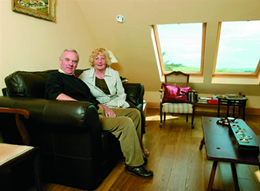Building into Retirement

Many people at retirement choose to down-size to a property that is often more economical to run and easier to maintain. However, if you wish to self-build this type of property in retirement it can be difficult to obtain mortgage finance. This advertisement feature from Buildstore looks at the considerations and risks involved.
Many lenders will not provide mortgage finance into retirement, and fewer will lend for self build projects, so the options are limited. Because of limited retirement incomes, many people cannot afford a short-term mortgage, and will need a mortgage be granted over a longer term (i.e. even further into retirement), perhaps on an interest only basis, but then will want to pay off the self build mortgage from the sale of their current home once the new house is complete.
Depending on your own specific circumstances, there are a couple of solutions for funding a self build project in retirement.

One option is to release equity from your current home through an 'equity release scheme', provided by some lenders, sometimes referred to as a 'lifetime mortgage'. This could provide the funds to purchase the plot of land and complete the build, and then loan would then be repaid from the proceeds of the sale of the current home. Depending on the lender and its terms, it is possible to repay just interest on the capital during the term of the loan, with the actual amount borrowed then repaid once the current property is sold. Some lenders may even consider 'rolling up' the interest to the loan, but whilst this means no repayments at all during the term of the loan, it's a more expensive option overall, and the amount owed can grow quickly, particularly if its a long project. As a result, lenders will tend to limit the amount they will lend in relation to the value of your property. Most self builders need the finance to buy the plot of land, and then will need further funds throughout the build, so ideally, its best to borrow the funds, as and when you need them, rather than have to draw down all of the funds at the outset and begin repaying the full amount immediately. Some lifetime mortgage schemes allow the flexibility to draw down the funds as and when they are needed. Those considering this option should check with the lender whether there are any penalty charges for repaying the loan early.
As an alternative, there are a select few lenders who specialise in self-build and can offer short-term finance facilities. With this solution, the mortgage is granted on the new property, rather than the current property (although the lender may want to take a legal charge over both). Such arrangements would typically be available on quite prescriptive terms, but it is still a viable solution. For example, the maximum term of the borrowing might be twelve months - during which the new property would need to be completed and the existing home sold. To ensure the build is completed within this timescale, it would be necessary for the land to have approved detailed planning permission, and the build would need to be undertaken by a main contractor. To avoid the risk of running over-budget, or over schedule, the lender would also prefer the terms for the build costs to be on a fixed price contract basis. With this arrangement, interest can be rolled up, however again the amount you owe can grow quickly. Again, interest can be rolled-up and funds cab be released in stages during the build.
Borrowing into retirement with a relatively restricted income is in itself an area that needs to be approached with caution; whilst borrowing for a self-build project adds further potential risk. Areas such as inheritance planning and your ongoing eligibility for means-tested benefits many also need to be considered. Seek advice from a specialist such as BuildStore to ensure that all of the potential risks are identified and considered. BuildStore has access to all lenders and products, including the two options detailed above, to find the best financial solution for you.


